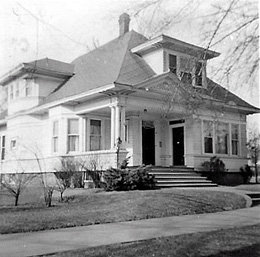On December 26, 1940, Walla Walla's first synagogue, Congregation Beth Israel Myer Youdovitch Memorial, is registered as a corporation in Olympia. After meeting informally for a few years, the Jewish community in Walla Walla raised support for a rabbi and facilities for him, his family, and religious services. It then organized a formal synagogue and eight individuals signed the articles of incorporation on December 19. The synagogue's first and only rabbi, Franklin Cone, will lead the synagogue for only a few years, but Congregation Beth Israel will continue to operate under lay leaders and in 1971 will move into expanded facilities. Membership will fluctuate over the years, and at the beginning of the twenty-first century the congregation will consist of some 35 families.
The Roots of a Rural Jewish Community
Walla Walla took form as a town in 1859, and although Jews were among the earliest settlers, it took a few generations before a large enough community was present to support Jewish institutions such as a synagogue. Some Jewish merchants operated or opened businesses in Walla Walla when gold was discovered in the eastern part of the territory, but the beginning of a local Jewish community followed the large migration of Jews from Eastern Europe in the late nineteenth and early twentieth centuries.
By the 1930s, there may have been as many as 75 Jewish families in Walla Walla, a number of which were successful and well established in the community. In 1936, heads of 20 of these families signed a petition for the establishment of a B'nai B'rith (Sons of the Covenant) lodge and an auxiliary women's group. B'nai B'rith, a cultural and philanthropic organization that has operated orphanages, hospitals, retirement homes, and an emergency relief fund, was instituted in Walla Walla with much pomp and public support on March 29, 1936.
The Community and the Congregation
Around the time of the establishment of Wall Walla's B'nai B'rith lodge, synagogue services began to occur regularly in private homes. One of these homes belonged to Myer and Celia Youdovitch, and after Myer's death in 1938, Celia proposed the establishment of a synagogue in his name. As Congregation Beth Israel Myer Youdovitch Memorial was taking form, in early 1940 a Jewish agency asked the congregation if it would support Rabbi Franklin Cohn (1906-1971) and his family, who had fled Germany. The congregation acquired a house at 329 E Rose Street to serve as both a residence and a synagogue and the synagogue was incorporated in December 1940.
Military operations in the region increased the number of Jews in the Walla Walla area and Cohn, the synagogue, and B'nai B'rith were kept busy responding the religious and social needs of Walla Walla's Jewish community. But Cohn had to supplement his income by working as a bookkeeper and in 1942 the Cohn family left Walla Walla for Seattle.
After the war, lay leaders and visiting rabbis led services at the synagogue, and in 1972 some 40 families celebrated the first Passover Seder held in a new synagogue building at the corner of Alder and Roosevelt streets. By the 1980s, there were only a dozen Jewish families affiliated with the synagogue and services were held only a few times during the year,.
But during the last decades of the twentieth century, a number of professionals moved into the area and brought new life to the synagogue. The synagogue serves some 35 families. It is affiliated with the Union for Reform Judaism and the congregation meets regularly and celebrates the major holidays.

